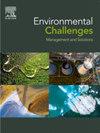What drives rice farmers away from straw burning? Evidence from the Mekong Delta, Vietnam
Q2 Environmental Science
引用次数: 0
Abstract
The Asian mega deltas are critical for food security since they are among the most productive regions for rice cultivation globally. However, this comes at the expense of their environment. Rice growing produces straw, which is frequently burned, resulting in considerable atmospheric pollution and greenhouse gases. Previous research in the Mekong Delta has suggested that policymakers can incentivize rice farmers to transition from straw burning to sustainable straw management practices by creating an enabling environment to support farmers in achieving economies of scale through collective governance of straw management and mechanization of straw collecting and processing. However, little is known about the drivers of rice straw burning in the Mekong Delta. To address this gap, we surveyed 543 rice farmers in four provinces in the Mekong Delta in Vietnam. Multinomial logistic regression was used to examine the determinants of the adoption of alternative straw management practices. The survey results indicate that straw burning is practiced by 45–84 % of rice farmers, depending on the season. The results from the model reveal that straw burning peaks in the Winter-Spring cropping season in An Giang province and is more likely to be practiced by larger or contract farms, while sustainable straw management practices are more frequently adopted by wealthier households or farms that receive agricultural extension services. These findings confirm the importance of agricultural extension programs in achieving economies of scale in sustainable straw management. Policymakers can leverage and scale the adoption of sustainable straw management through public extension programs and by encouraging companies to govern and support these practices through private extension in their production contracts.
是什么促使稻农放弃焚烧秸秆?证据来自越南湄公河三角洲
亚洲大三角洲对粮食安全至关重要,因为它们是全球水稻种植产量最高的地区之一。然而,这是以他们的环境为代价的。水稻种植产生秸秆,秸秆经常被焚烧,造成相当大的大气污染和温室气体。先前在湄公河三角洲的研究表明,决策者可以通过创造有利的环境,支持农民通过集体治理秸秆管理和秸秆收集和加工机械化实现规模经济,从而激励稻农从秸秆焚烧转向可持续的秸秆管理实践。然而,人们对湄公河三角洲焚烧稻草的原因知之甚少。为了解决这一差距,我们调查了越南湄公河三角洲四个省份的543名稻农。采用多项逻辑回归来检验采用替代秸秆管理措施的决定因素。调查结果表明,45 - 84%的稻农根据季节的不同采取焚烧秸秆的做法。该模型的结果显示,在安江省,秸秆焚烧在冬春种植季达到高峰,更有可能由大型农场或合同农场实施,而可持续秸秆管理措施更常被较富裕的家庭或接受农业推广服务的农场采用。这些发现证实了农业推广项目在实现可持续秸秆管理规模经济方面的重要性。政策制定者可以通过公共推广项目,鼓励企业在生产合同中通过私人推广来管理和支持可持续秸秆管理,从而推动和扩大可持续秸秆管理的采用。
本文章由计算机程序翻译,如有差异,请以英文原文为准。
求助全文
约1分钟内获得全文
求助全文
来源期刊

Environmental Challenges
Environmental Science-Environmental Engineering
CiteScore
8.00
自引率
0.00%
发文量
249
审稿时长
8 weeks
 求助内容:
求助内容: 应助结果提醒方式:
应助结果提醒方式:


